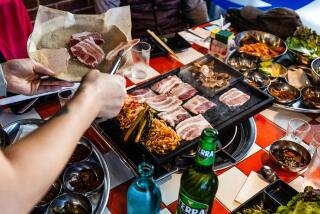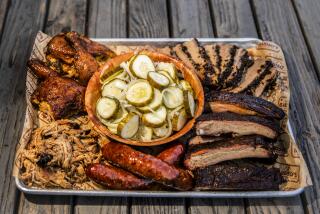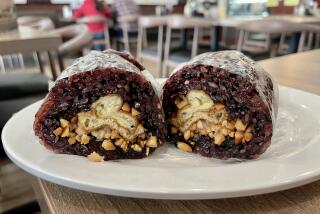Briquets: Hot Topic for the Grillmaster
- Share via
Back-yard cooks who are getting ready to throw something on the barbie over Labor Day will find themselves confronted with an array of new charcoal and wood products.
The new offerings include instant-lighting charcoal in a bag that you place on the grill and light, sack and all; star-shaped briquets designed to light faster and burn more evenly; charcoal laced with flavorful mesquite flakes; a huge variety of woods that add a smoky taste, and even “designer label” charcoal that once was steeped in Jack Daniel’s bourbon.
Deciding which is best for your patio party depends on whether you want to get your hands dirty; how much you’re willing to spend; the kind of grill you are using, and, to some extent, the flavor you want to add to your food.
The latest addition to the half-billion-dollar briquet market is charcoal in a bag--pre-measured briquets that have been treated with starter fluid. The big advantage is that you simply throw the bag in the grill and light it, avoiding the mess of starter fluids and of distributing the coals by hand; the drawback is that it costs more than conventional charcoal.
Oakland-based Kingsford Products Co., which sells more than half of all the charcoal used in the United States, brought out the 2 1/2-pound BBQ BAG this summer. It says the product can cut grill prep time nearly in half, partly because the pre-treated briquets get to cooking stage about 10 minutes faster than conventional coals.
Refinement of Match Light
The BBQ BAG is a refinement on Kingsford’s Match Light, pre-treated briquets introduced in 1980. According to Kingsford, Match Light itself has undergone a formula change and now lights twice as fast as previously.
Kingsford won’t say how much lighter fluid is in each briquet but said that, with regular coals, cooks should use 3/8 to 1/2 cup of fluid on 2 1/2 to 3 pounds of briquets. Neither regular nor pre-treated briquets should leave an aftertaste if the coals are allowed to properly ash (gray on the top) before the food is cooked, it said.
Kingsford’s conventional charcoal costs about $2.29 for 5 pounds; Match Light is priced about $4.29 for 8 pounds, and the BBQ BAG goes for about $1.79 for 2 1/2 pounds. In both cases, however, cooks save the expense of lighter fluid, which costs about $1.29 for a pint can.
Aside from the higher price, the pre-treated charcoals have other potential drawbacks. While Kingsford says the briquets are suitable for most grills, some experts advise against using them in ceramic barbecues such as the Imperial Kamado, a Japanese earthenware barbecue/smoker. The clay of ceramic grills tends to absorb the smell from the burning lighter fluid.
In addition, Kingsford recommends taking special care in storage of pre-treated briquets because the lighter fluid may evaporate. For best results, it should be kept in a sealed plastic bag or covered container in a cool, dry place.
That advice might well apply to all charcoal, which deteriorates rapidly if it absorbs moisture from the air, said Stuart McDonald, president of the Australian-based Galore Group, which operates 13 Barbeques Galore stores in California. But he said it’s especially the case with instant light.
“I don’t think it’s necessary to keep it in the house, although it should be relatively safe,” McDonald said. “I think in a container outside or in the garage is better.”
McDonald and several other industry people said that, except for the convenient, ready-to-use bags, the trend is toward natural wood products and away from chemicals.
Along those lines, one alternative is Happy Jack, a single-use bag filled with mesquite and oakwood charcoal coated with a fine layer of paraffin wax. A spokesman for Happy Jack Products in the Pacific Palisades maintained that the pure wood charcoal burns hotter and longer than the regular kinds and is odorless. It costs 99 cents for a 2-pound bag.
For cooks willing to get their hands dirty, Hesperus Co. of Neenah, Wis., offers the star-shaped Starfire briquet, designed to start easier and burn faster than even treated charcoals. The five-pointed briquets have a bigger burning surface and a hole in the middle that the manufacturer says acts as a fast-lighting chimney.
Hot Enough for Cooking
“If you take 16 of our stars and stack them in a pyramid, add 4 ounces of lighter fluid, let it sink in a minute and light it, 10 minutes later the fire will be hot enough to cook on,” claimed Fred Hrubecky, one of the inventors.
Hrubecky said one star briquet is equal to about four conventionally shaped ones. A 7 1/2-pound bag of Starfire retails between $3 and $4.
In addition to their regular charcoals, many manufacturers now offer charcoal with mesquite wood flakes pressed into the briquets; others offer 100% mesquite wood chunks, most of which come from Texas and Mexico. Mesquite’s fans say it burns hotter than ordinary wood and adds a distinctive flavor to meat and fish.
Although mesquite, hickory and oak wood flavorings have long been on the market for barbecuing, a variety of other wood chips--alderwood, maplewood, apple, peach, cheery and pear wood--are now being offered to add flavor to foods. Most must be soaked in water before being added to coals.
Grapevine clippings, and white oak chips from aging barrels used for Jack Daniel’s bourbon are the latest additions. And the Lynchburg, Tenn., distillery has also just hit the market with Jack Daniel’s Charcoal Briquets.
Hickory Specialties of Crossville Tenn., a licensee of the distillery, blends the used char from Jack Daniels’ 500-gallon mellowing vats into high-grade charcoal. It comes in a black bag with the white logo of the famous whiskey, and sells for $3 to $4 for a 10-pound bag.
The company has been marketing the product in Southern California for only three months and plans to increase distribution here considerably in 1989.
More to Read
Eat your way across L.A.
Get our weekly Tasting Notes newsletter for reviews, news and more.
You may occasionally receive promotional content from the Los Angeles Times.










